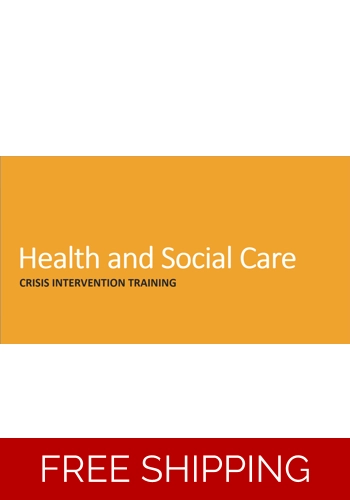Crisis Intervention Awareness - All Settings
Crisis Intervention Awareness Training Resources - For All Types of Care Settings
Presentation, Handout and End of Session Assessment.
All editable to suit your training session and audience should you wish to edit.
This presentation (131 slides in sections) on crisis intervention training equips participants with the knowledge and skills necessary to effectively respond to crisis situations, ensuring the safety of both individuals in crisis and staff.
It emphasises key principles of crisis intervention, including the importance of a non-confrontational approach, early identification of distress signs, and potential ligature risks in high-risk environments.
De-escalation techniques, legal and ethical considerations, and effective communication skills are highlighted as critical components.
The presentation aims to foster a comprehensive understanding of crisis intervention, enabling individuals to respond effectively and compassionately in challenging circumstances.
Aims and Objectives: (You can adapt)
Overall Aim:
- To equip participants with the knowledge and skills necessary to effectively intervene in crisis situations and ensure the safety of individuals and staff.
Learning Objectives:
- Understand the key principles of crisis intervention and the importance of a non-confrontational approach.
- Identify early signs of distress and potential ligature risks in high-risk environments.
- De-escalation techniques to defuse tense situations and reduce the risk of harm.
- Legal and ethical considerations when dealing with individuals in crisis, ensuring compliance with relevant regulations.
- Effective communication and active listening skills to engage with individuals in crisis, facilitating their well-being and support.
Presentation (131 Slides)
Aim and Objectives
Introduction
SECTION - DEFINITION OF A CRISIS
What Constitutes a Crisis Situation?
Examples of Crisis Scenarios
SECTION - SIGNS OF DISTRESS
Recognising Signs of Distress
Behavioual Changes
Verbal Cues
Importance of Taking Verbal Cues Seriously
Physical Indicators
Importance of Taking Physical Indicators Seriously
Isolation
SECTION - DE-ESCALATION TECHNIQUES
introduction
De-escalation Techniques - Importance in Crisis Intervention
Non-Confrontational Methods
Active Listening
Key Components
Conclusion
Crisis Response Plan
Importance of a Crisis Response Plan
Components of a Crisis Response Plan
Conclusion
SECTION - SAFETY PROTOCOLS
Creating a Safe Environment
Importance of Creating a Safe Environment
Elements of a Safety Protocol
Physical Layout and Emergency Response
Supervision/Observation
Personal Items/Contraband
Security Measures
Communication/Notification
De-Escalation Techniques
Crisis Response Teams
Identifying and Addressing Potential Ligature Points
Importance of Removing Ligature points
Methods for Removing Ligature Points
Training/Staff Competency
Regular Updates and Maintenance
Conclusion
SECTION - RISK ASSESSMENT IN A CRISIS SITUATION
Making Informed Decisions in Crisis Situations
Informed Decision Making/Individualised Approach
Components of Risk Assessment
Risk Assessment Process
Risk Categories
Collaboration and Communication
Conclusion
SECTION - Legal and Ethical Considerations
Legal and Ethical Considerations
Other Legal and Ethical Considerations
Legal Responsibilities
Ethical Considerations
Autonomy and Privacy
Crisis Specific Considerations
Restraint and Seclusion
Body Cameras
Body Cameras - Restraint/Seclusion
SECTION - SELF-CARE
Prioritising Well-Being
The Importance of Self-Care
Strategies for Managing Emotional Well-Bring
SECTION - SUMMARY OF LEARNING
Slides for each Learning Objective
References and Further Reading
Word Documents
Handout - 29 Pages - you can split to produce your own individual handouts
End of Session Assessment - Multiple Choice
HSC Training Link
Training Resources for Health and Social Care
Supplying training resources for the health and social care sector since 2004.
Resources purchased are emailed to you via Zip Folder attachment.
All packs are written in a generic style and can easily be adapted to suit your own specific training delivery.
Secure payments via PayPal Merchant Commerce Platform.
You do not need a PayPal account to use this payment gateway.
Debit and credit card payments accepted.



